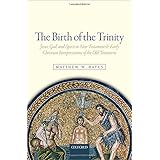The Birth of the Trinity: Jesus, God, and the Spirit in New Testament & Early Christian Interpretations of the Old Testament
Oxford: OUP, 2015.
Available at Amazon.com
In a fresh approach to Christian trinitarian interpretation, Bates proposes that the doctrine of the Trinity emerged, partly, out of how NT readings of OT texts, specifically, prosopological exegesis, whereby several OT texts were regarded as reporting intra-trinitarian conversations. This is what specifically contributed to the idea of the plurality of God as consisting of three distinct persons! He goes so far as to say that he prefers to speak of a Christology of Divine Persons than a Christology of Divinity Identity. Bates knows that whether one should read the OT this way is an open question these days, but he observes that it was no less a question back in the early church. He demonstrates how Justin and Tertullian are prime examples of a person-centered reading strategy that claims to find traces of divine dialogue in the OT. He also leans on Irenaeus who said that one makes a good reading “good” is that when all the individual tiles are put together that they form a discernible mosaic. In his epilogue, Bates concludes:
As we have repeatedly observed, the theodramatic reading strategy employed by the earliest Christians did not immediately lend itself to conceptualizing the persons of the triune God in terms of subordination and procession, although neither are the persons so described inimical to such relational terms; rather, the divine persons thereby revealed show an unremitting personal concern for one another. Moreover, I believe the assumptions, details, and implications of prosopological exegesis substantially undercut scholarly theses that such a backward movement of Christology- that is, it undermines the idea that the first Christians did not regard Jesus as the preexistent Son of God but only came to regard him as such when he was adopted as son at his resurrection, with Jesus’ Sonship then retrojected in time. On the contrary, prosopological exegesis regarded Jesus as a preexistent person, the Son, and as such he was deemed capable of conversing with God the Father prior to his incarnation (p. 204).
See also the review by Joshua Jipp at Themelios.












